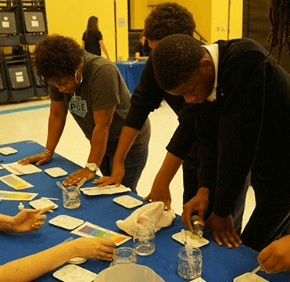By Catholic Review Staff
More than 75 students and families of Mother Seton Academy Catholic middle school in Baltimore recently attended a special interactive program, “Child’s Play 2.0 – Making Science and Math Fun for Students,” offered by the Maryland Science Center and the Regional Manufacturing Institute of Maryland.
The program provided participants with a hands-on opportunity to engage in a dozen interactive experiments based on the foundation of math and science challenges, according to a news release.
The pilot program was organized by Thomas Maze, president of Polaris Profiles, and sponsored by Albert “Skip” Counselman, chairman and CEO of RCM&D, both active members of the Cathedral of Mary Our Queen in Homeland.
The goal of the program is to address the long-term demand and current shortage of STEM-educated workers in Baltimore-based schools and to highlight the myriad employment opportunities for graduates with proficiency in science, math and related fields of study.
“This is a fulfilling pilot program that children in all Maryland middle schools should be exposed to, as it creates a practical context for learning STEM-related curriculum and represents broad and promising career possibilities for their futures,” said School Sister of Notre Dame Margaret “Peggy” Juskelis, Mother Seton Academy president.
Counselman added: “We have supported the Mother Seton Academy for more than 15 years and are proud to help produce this type of innovative, collaborative learning program to benefit the students and their families.”
The U.S. Department of Labor reports that the United States ranks 27th in the world of developed countries for the number of students who pursue education and careers in science, technology, engineering and math. Currently, less than two-thirds of the region’s manufacturing employment needs are being filled.
“Our program aims to help students develop awareness and passion for education and careers in science and engineering,” Maze said. “The initial grassroots initiatives of joining students, parents and educators together will help us build the foundation to begin addressing these issues. The next phase is to develop the prototype program that can be replicated in communities throughout Maryland that will help to increase the rate of STEM graduations and elevate the economy and quality of life for many families.”
Also see:
School of the Incarnation celebrates 10 years of “Giving Back”


